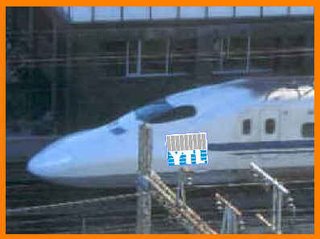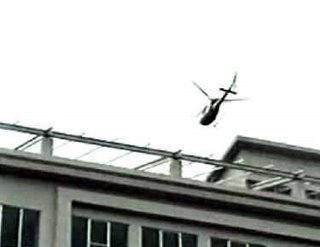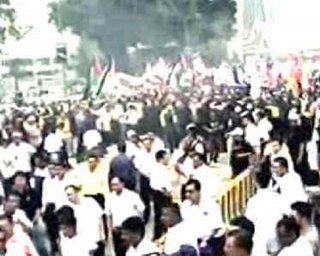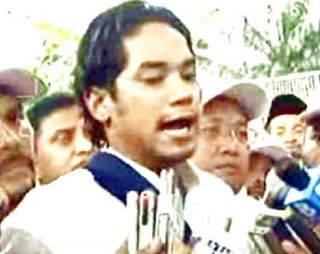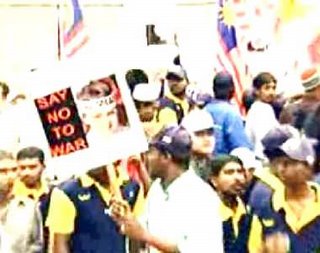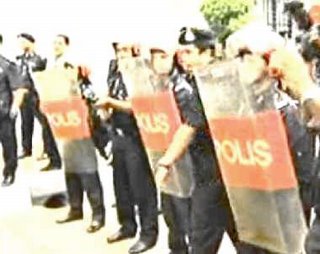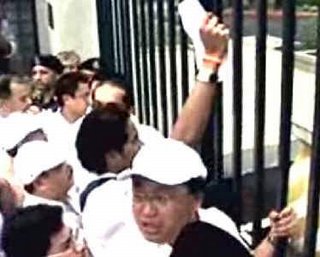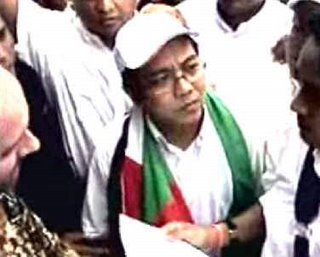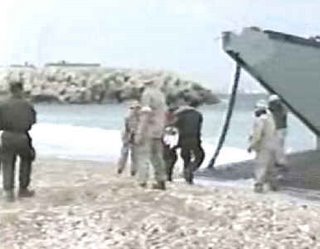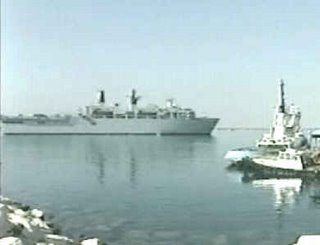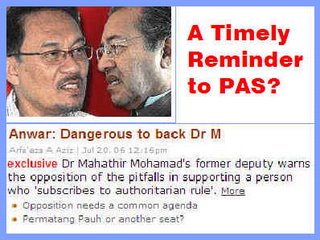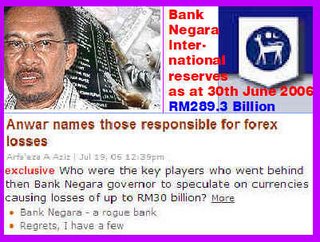
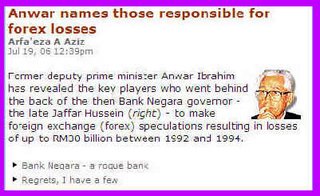 Anwar names those responsible for forex losses
Anwar names those responsible for forex losses
One of the four persons anmed is dead and gone, and the balance 3, 2 are his known political opponents that cannot be "beaten or overcome" and that can inflict retribution or vengeance.
Who are they?
Get a subscription, Malaysiakini needs your SUPPORT
http://www.malaysiakini.com/pages/subscription/
and read it at
http://www.malaysiakini.com/news/54097
But are names and handles important? 'What is your name, each of you?' My name is also nameless. I have no name. You give yourselves names, because you believe they are important. Understand, our existence is nameless. It is NOT voiceless, but it is nameless. The names you take are structures upon which you hang your images . . . What you are cannot be UTTERED, and NO letter or alphabet can contain it. Yet, now you need words and letters, and names and objects. You want magic that will tell you what you are. I have had TOO many identities to cling to ONE name.

now the Q & A
Q&A: Yes, I could have done more; Arfa'eza A Aziz Jul 19, 06 1:50pm
Former deputy premier and Parti Keadilan Rakyat adviser Anwar Ibrahim reveals where the country went wrong and his economic vision in this second of a three-part exclusive interview with malaysiakini.
Malaysiakini: International Trade and Industry Minister Rafidah Aziz states that Malaysia is still an attractive destination as the first six months of 2006, the country has drawn in RM6.08 billion of FDI (foreign direct investment). But you claim otherwise.
Anwar: Rafidah is in a state of denial. This (information) is part of propaganda. You can have commitments in the range of RM10 billion but the fact is, FDI can only be real when the foreign companies come and operate (in the country).
So a company comes in with RM10 billion, they start in 2007 and end in 2020.
So when can we apply this amount (to the statistics)? It should be distributed evenly over those years but instead you (the government) put the entire figure immediately in the statistics. That is why when you asked if I regretted joining the government, I said 'no' because I learnt the tricks of the trade. You can't fool (me) with figures anymore.
Another issue of concern is confidence. We are not talking only about competition with China or India as investment destinations but also Vietnam, Thailand and to an extent even Indonesia. Look at our market capitalisation, actual investments of FDI in the country, the capital flight out of Malaysia.
How do you assess the confidence in the system? By looking at the statistics in toto. You cannot simply pick three or four companies and make a conclusion.
I would suggest that Prime Minister Abdullah (Ahmad Badawi) looks at this because it is a serious problem. Unemployment is high, there is an inflation problem and FDI is not coming in. You are not only postponing (resolving the problems) but, probably even not accepting the fact that we are in trouble. They continue to say that we are one of the successful Muslim countries in the world compared to Mali and Bangladesh - I wouldn't deny that we are doing much better than them.
But to get Malaysians to understand and not get sucked in by the propaganda, I ask them to look at the countries in the region: Malaysia, Singapore, Thailand, South Korea. Look at their positions in the 1970s, then in the 1980s and then in 2006. They have gone way ahead. They have double the success that we have achieved.
Now if I was asked to deal with it, I would say: first, we must accept the fact that although we are generally better than the weaker counties, we are losing to our competitors in terms of FDI, technology, etc. Then, we chart a programme. The Ninth Malaysia Plan was an exceptional opportunity for Abdullah to recognise this problem and say that it's time we deal with it. On this, he has failed miserably.
* What would Anwar Ibrahim's economic programme be like?
First, I would say look at the facts and deal with it. I am not suggesting that the country has totally failed. To the credit of past and present leaders, at least there is political stability. The country's economy is sluggish but not totally destroyed. But it is beginning to be quite critical for Malaysia now. If you accept that, the programme would be realistic.
Competition is a major issue to be addressed. Why did we lose our competitiveness? How do we regain it? One (of the problems) is the perception of the National Economic Policy (NEP). The perception is that everything has to do with (the) bumiputera (policy), which is not entirely correct. It has everything to do with corruption, not the bumiputera policy. It is an abuse of that policy because people use that to squander wealth ...to distribute billions for their family members and cronies.
So to my mind, the best way is to do away with it and have programmes that are more transparent. Do we then ignore the fate of the marginalised and poor? I say we don't. Countries that do not have affirmative action programmes do deal with these issues. These countries seem to be realistic in their policies, sustainable in their economy, which pave the way for poverty elimination, public housing, quality education for the urban and rural poor - these are issues I feel passionately about and I think we have to move (on them).
That would mean the dismantling of the current economic policy. But what did the Umno leaders - in particular the Umno Youth leaders - say to this? (They said) Anwar is getting too friendly with the Chinese, he is forsaking the very agenda that he (had once) supported. Of course, I supported the NEP in 1970 when I was 19. At that time, I saw that the Malays were so insecure. I saw that in my peers at the university. With the very few exceptions among the children of the bureaucrats, nobody had any success. So, (the NEP was) fair.
But then things have changed... not that Malaysia has done exceptionally better but we have tried. We had been successful in some things like social mobility, education standard and scholarships, but here we have to make some amends.
I always recite this good example based on my experience in Penang where I met a 19-year-old Chinese girl who scored 9A1s but failed to get a place in the local university. We told her: 'Sorry, this was the policy and that the quota had been met'. But what about this poor girl whose father is a petty trader and can't afford to send her overseas? This is the basic principle of justice that should transcend race. We as Muslims must actually appreciate this more because we talk about justice irrespective of race.
By doing this, I don't mean that I am willingly sacrificing the poor Malays. Recently, I spoke on education - about the government's disbursement of funds on primary education which is close to (the level of) those sub-Sahara ... African countries. In one go, you sacrifice the country's future generations and at the same time you don't cater for the marginalised groups in the rural areas, including in Sabah and Sarawak where the vast majority of rural folks are.
When you talk about the quality of education, you also touch on the mediocre leadership in universities. I addressed this (issue) to some 50,000 people - majority were PAS supporters and ulama (Muslim religious scholars). I asked, is there something wrong against Malay interests, or Islam, when you have 20 public institutions in the country and you have five Chinese vice-chancellors, or three or two Indians, or one or two non-Muslim bumiputera?
These are qualified people, and I challenged them (the crowd) to make sure that the universities excel in academic standards. Make sure that the Chinese, Indians and Malays are treated equally ... These are the things that we should do because only then we are presenting the case that we trust each other - the Chinese, the Malays and the Indians. But we don't seem to be able to do that. Of course, you can't expect, MCA, Gerakan or MIC to say or articulate anything about this.
* Why not?
It is not because they do not want to raise sensitive (issues) with Umno. My experience in the cabinet, (the non-Malay) leaders unfortunately don't take it (the issues) up ... even if the issues are not very sensitive to the prime minister. They won't say: 'We consider whether this brilliant Chinese academic could head this public university'. They wouldn't dare! But what will they ask for? (They ask) can we participate in the Klang Port privatization ?
· But there were questionable decisions made by you while you were finance minister. For example, the Bank Negara's foreign exchange losses in 1992-1994 where we lost, some say, up to RM30 billion. You were also the Bakun chairperson and the (Umno-linked) MRCB (Malaysian Resources Corporation Berhad) takeover was also during your time.
The (Umno-linked tycoon) Tajuddin (Ramli) court case... I am glad that it had surfaced because it explained a lot of things about those who were involved and those who were covering up the story. I am inconsequential in that decision.
As to the forex losses, I had to table it to Parliament. Not convincing, of course, because there was a limit to what I could do... given the circumstances then. I then had to advise (former Bank Negara governor, the late) Tan Sri Jaafar (Hussein) and (Bank Negara assistant governor) Nor Mohamed Yakcop (now second finance minister) to resign.
* Can you tell us exactly what happened then. Who told Bank Negara to go into forex speculation?
The law is quite clear. Bank Negara had the option to protect its resources and this is normal - it is not speculation as such but only to use a small amount of fund to trade in order to protect the reserves. That was the standard reply I had given, at the advice from the governor.
But then, I realised that I was not informed by the bank. I only knew from friends overseas. In fact, I knew from a Switzerland friend who told me: 'Look Anwar, Bank Negara's ringgit speculation was huge'. I told him that couldn't be as we needed to protect our reserves. But he told me that you (Bank Negara) were one of the top three. One of the top! I said (it was) impossible that we could be among (the countries) which have billions of dollars to speculate on forex.
The week later, I was in Hong Kong where an editor of the Far Eastern Economic Review asked me very bluntly: 'Look, are you giving a political reply because we have our sources to say that you're deeply involved'. I replied that I was not giving a political reply and I was giving a policy decision that we allowed for a small amount (to speculate) to protect the reserves and it was done completely by the central bank, and the minister of finance was not privy to it...
Then after the interview, he confided in me and told me that it was time for me to call the central bank. So I called. The governor was on his way to Iran with the prime minister. I asked him: 'I was told that we have a big problem', and he, of course, denied it. Nor Mohamed said it was only a small amount. I told him I did not believe that the business editor of the Far Eastern Economic Review would lie to me, and neither would I believe that my Swiss friend was lying to me. I needed a report.
He (Jaafar) then promised to give a report after he returned from Iraq. So he checked with Nor Mohamed who again denied (the problem). Then he went to Dr Mahathir and he came back and told me that he met the prime minister (who claimed that there was) no such problem. He (Mahathir) accused the foreign media and foreign interests of trying to cause disruption and lack of confidence in the system. But I still (told) Tan Sri Jaffar (to) say (that) I was not satisfied. Then Jaffar started to confide in me and he swore to God that he knew nothing.
* So it was Nor Mohamed who was responsible for the huge losses?
It was Nor Mohamad, Mahathir and Daim! That was the time I just came in (as finance minister). But I trusted Tan Sri Jaffar who did not know until I asked. He had genuinely thought that it was a small amount. By the time I got the picture, the problem was huge. We were talking about losses in the range close to US$10 billion. But, of course, the billions can still be saved because it is partly paper and partly real - you can never know until the audited account for that particular year comes out. So time was closing in for the accounts.
I got the figures and I told Dr Mahathir that I have no choice but to ask Nor Mohamed to leave. He said that it was not fair, this and that, but I persuaded him because under the circumstances Nor Mohamed could be charged. Mahathir said no, don't touch them, just let them go. I told him, I can't go on like this. How can I go and explain to the Parliament and say that these were the real losses and these were the people involved?
It is unfortunate for Tan Sri Jaffar because I rated him highly. He was a man with high integrity, strict, honest, incorruptible and he used to confide in me a lot and had been very helpful to me in advising me. He was supportive.
So they left. I had the then Bank Negara deputy governor meet me for an hour a day - solid briefing because this was too complex - (the) intricacies on forex trade, which was new to me. I had to really master the subject because I had to deal with Parliament. I called it the worst experience I have had. We had to cover the losses and I don't think Bank Negara was able to cover it.
Finally, when Dr Mahathir had the chance, he brought back Nor Mohamed (as economic adviser) because clearly they were in league (together). You are talking about a person who cost the country 10, 15, 20 billion ringgit of real losses and yet you (Abdullah) promoted him as (second) finance minister. Yes, we were good friends but we are talking about protecting the interests of the country.
* Was there any decision that you regret making?
Yes. You try your best but there were a lot of constraints. For example, if you look at the Education Act (1961). If you remember, once I had then (as the education minister) announced that I wanted to do a new education act. We had the draft bill ready. We invited the teachers' representatives - Malay teachers and (Chinese education movement) Dong Jiao (Zong) - everybody... they saw the draft because we wanted to repeal the controversial section 21(2) (the right of the education minister to close down vernacular primary schools), but I don't want to be seen as conceding to the Chinese.
Then Auku (Universities and University Colleges Act, 1971). The entire legislation was to be a new legislation. There was a draft and it was circulated. So people can't say that Anwar did not do it. It was there in the public domain. Then I was transferred to the Finance Ministry. (Subsequent education ministers) Sulaiman (Daud) and Najib (Abdul Razak) did not take it up.
Later, Najib took it up but then he had something else and kept the thing. I regretted because I could have pushed it (to be tabled and passed) faster. It was a controversial bill. Dr Mahathir didn't agree to repeal the Auku. He told me: 'Cannot, Anwar. It (Auku) is very important. Don't take it personally...' He was very kind in that sense... I had that advantage... in cabinet, he was never rough. He reserved (his iron fist) to the last...
* What about decisions when you were at the Treasury?
Even at the Treasury, sometimes with the best of intentions, the Treasury gave strong advice but I was not able to do it, like the airport you said I was appointed chairman of the (Kuala Lumpur International) airport, but only because the prime minister appointed me.
But it was known in the Treasury that we were against the proposal to (move the airport) to Sepang. We wanted to expand the facilities in (the then international airport) Subang because the cost would be 10 times less. This is not something that I am only saying now. Because prior to the cabinet (meeting), there is the economic strategic plan meeting where I proposed the option but then he (Mahathir) said it was important (to move to Sepang). So that was it.
And the Bakun (dam project in Sarawak) - I said that it would proceed after the evaluation by the EIA (environmental impact assessment) but Mahathir announced it before the evaluation was made. Some said that I should have been more firm but I wasn't. But if I had done that, I would have been sacked in 1993.
* Regarding the social and religious problems in Malaysia, you have suggested that the different racial and religious communities should start talking to each other. But there is no forum to provide that kind of necessary dialogue.
Yes. My worry is that the BN (Barisan Nasional) government tends to tolerate this conflict a bit because it serves to benefit them in the long run. If you look at the courses, which is under the Prime Minister's Department.BTN (Biro Tata Negara) It is clearly racist. Has any minister – Chinese minister - taken up this issue to re-look the curriculum?
Ask the students who attended these courses. Am I exaggerating or trying to mislead? Why do I take this up? It is just not another political (issue) for Keadilan, but we are talking about the next generation of this country. Anybody who does not seem to agree with them are American agents! Or pro-Chinese. You question the NEP - although I am very Malay and I want the Malays to succeed - I'm immediately put as pro-Chinese. Who does that? PM's Department professors!
* Do you think the BTN should be dismantled?
Either dismantle it or improve it. The intention was to get people trained in diplomacy, to understand the country. These are noble intentions. But it is then used as an Umno political apparatus. There are now racist messages! This is really dangerous. When I was in prison, I learnt from the prison guards who told me they cried because they were given facts on how much the Malays have lost and the Chinese are so greedy to make demands to dismantle everything that we Malays have.
This poor guy is innocent because he genuinely believed it. So I asked him who stole most of the APs (Approved Permits)? Was it Ah Chong or the Malays? Who decided to give Bakun to (tycoon) Ting Pek Khing? Then they started to realise that the (BTN) arguments were flawed. I don't know whether Abdullah is aware. I'd be surprised and disappointed if he doesn't. But if he knows, it is ethically and morally wrong for him to condone this.
I am not saying this because the BTN considers me public enemy No 1. There is no (BTN) course that had not abused me as to my alleged sexual misconduct - that is, of course, less now because the mufti (state religious adviser) have told them that they will go to hell if they make accusations without evidence - but I (continue) to be labeled as an American agent, CIA agent and also pro-Chinese.
Tomorrow: My future in the opposition
Now the BACKGROUND to this Forex SAGA; Speech by Lim Kit Siang
(Parliament, Wednesday, 12th July 2006) More than 12 years ago, in my speech during the debate on the Royal Address on April 11, 1994, I reiterated my call for a Royal Commission of Inquiry into the colossal Bank Negara foreign exchange losses as a result of speculation in the international currency markets from 1992-1994, with the losses cited as ranging from RM10 billion to RM30 billion.
The arguments I advanced for such a Royal Commission of Inquiry more than a decade ago are even more valid today. I quote:
“The Royal Commission of Inquiry should first determine the actual extent of the forex losses suffered by Bank Negara since 1992.
“I had said that for the two years of 1992 and 1993, Bank Negara’s forex losses could range from RM 16.5 billion to RM25.6 billion. The total forex losses could be more when we take into account the RM1.4 billion contingent liability for 1994 arising from forward forex commitments.
“Could there be other hidden and secret forex losses in the 1992 and 1993 Bank Negara accounts apart from those who had discussed?
“There could be. I will just give one possibility. Bank Negara had been accused for instance of dumping large amounts of Ringgit into the market in the closing days of 1993 to buy US Dollars, causing the Ringgit to fall steeply. That manoeuvre improved Bank Negara’s year-end financial position by raising the value of its currency and gold reserves in Ringgit terms.
“It is interesting to note that as of November 30, 1993, Bank Negara’s Gold and Foreign Exchange and Other Reserves including SDRs stood at RM60 billion, but within a month by December 31, 1993, it had shot up by RM16.4 billion to Rm76.4 billion – an hefty increase of 26 per cent in one month.
“Bank Negara’s Gold and Foreign Exchange and Other Reserves including SDRs stood at RM46.2 billion. If it had increased at 26 per cent per month, as happened in the one month of December 1993, Bank Negara’s Gold and Foreign Exchange and Other Reserves would have multiplied to the impossible figure of RM587 billion!
“It is therefore possible that the RM16.4 billion increase of Gold and Foreign Exchange and Other reserves could conceal forex losses, bringing total forex losses to over RM30 billion since 1992.
“The first task of the Royal Commission of Inquiry is to ascertain whether Bank Negara’s forex losses since 1992 could exceed RM30 billion.
“The second task of the Royal Commission of Inquiry is to ascertain whether there had been any financial malpractices and abuses in view of the inconsistencies and conflicting explanations about the colossal forex losses.
“It is ridiculous for Bank Negara to blame the late delivery of sophisticated computers for causing such huge forex losses. After all, how is it that Bank Negara can not only not lose money but make profits in the past without these sophisticated computers? And how is it that unsophisticated Central Banks of other countries which do not have sophisticated computers do not incur such colossal losses from forward forex operations?
“Thirdly, the Royal Commission of Inquiry should establish as to how the Bank Negara could incur such colossal losses.
“In fact, Anwar Ibrahim should be able to tell Parliament the size and details of Bank Negara’s foreign exchange losses, by releasing details on Bank Negara’s foreign transactions, the composition of its reserves, aspects of its intervention operations and its forward commitments in the various currencies.
“Last April, Jaffar said that to give details would be “show my hand to the market”, and that “There should be no problems in disclosing such information if the bank is lo longer in the foreign exchange business.”
“Anwar Ibrahim said the same thing in Parliament during question time on July 19.
“Now that Bank Negara had announced that it has ceased all forward transactions and that all positions had been unwound, Anwar Ibrahim should have no reason to refuse to furnish all these details about Bank Negara’s colossal forex losses to Parliament.”
As I said 12 years ago, Bank Negara was at the time insolvent – its liabilities exceeded its assets – and the Bank Negara Governor and its Board could have been suspended and the bank taken over if it had been a commercial bank.
Let me clarify that when I made these assumptions about Bank Negara forex losses as a result of foreign exchange speculation spree could be as high as RM30 billion, I did not get the facts and figures from thin air, but I had the able and expert assistance of a former topmost Bank Negara officer.
After more than 12 -14 years, the government has still failed to “come clean” on the colossal Bank Negara forex losses and the ghosts of the RM30 billion Bank Negara forex losses have not been exorcised – resurfacing only last week to haunt the present administration of the Prime Minister, Datuk Seri Abdullah Ahmad Badawi, testing its commitment to accountability, transparency, integrity and good governance.
Many other questions which I had raised over a decade ago remained unanswered and continues to haunt the corridors of power, viz:
• whether Bank Negara’s maximum exposure at the height of its forward foreign exchange speculation was in the region of RM270 billion, which was three times the country’s GDP and more than five times the country’s foreign reserves at the time; and
• whether at the height of the Bank Negara forex speculation spree, Bank Negara was so aggressive that it operated not only in US$50 million lots but there had also been occasions when Bank Negara operated with US$500 million in one call!
We now know that Bank Negara’s multi-billion ringgit forex losses was because of Mahathir’s nemesis, George Soros who had betted in favour of the British pound against Bank Negara.
The time has come for full and total disclosure of the RM30 billion Bank Negara forex losses as to how these so-called “paper losses” as described by government leaders had triggered off other mega-financial scandals like the RM1.8 billion MAS-Tajudin privatization scam – the purported “national service” of Tajudin Ramli in 1994 to buy MAS shares to help out Bank Negara (which owned the MAS shares) which was hit by the multi-billion ringgit forex losses.
Were the major players in this scam performing a national service or were involved in a national betrayal?
At the time when I raised the Bank Negara forex losses in the House, the then Prime Minister, Dr. Mahathir said the forex losses came from “profits made in forex dealings in preceding years” while the then Finance Minister, Datuk Seri Anwar Ibrahim, that the Bank Negara forex losses were mere “paper losses”.
Former premier Tun Dr. Mahathir Mohamad is now an advocate of accountability and transparency, declaring that Official Secrets Act should not be used to hide untruths. He should be taken at his word, and all secret documents on the Bank Negara forex losses of 1992-1994 should be declassified so that Malaysians can finally know the truth of what is probably the biggest mega-financial scandal in the nation’s history.
Anwar may not be in the loop at the time although he was Finance Minister, with regard to whatever “overriding agreements” Mahathir and his then loyal economic adviser, Tun Daim Zainuddin, devised with other corporate high-flyers to salvage Bank Negara, but Anwar has now the opportunity to throw light of what he knew about the colossal Bank Negara forex losses when he was Finance Minister and how these “paper losses” had triggered off other mega-financial scandals like the RM1.8 billion MAS-Tajudin privatization scam.
Before I end, let me quote from a 1995 book on international high finance, The Vandal’s Crown by Gregory J. Millman to illustrate why Parliament even today should take a serious attitude on the Bank Negara forex scandal:
"Using all the resources a central bank commands - privileged information, unlimited credit, regulatory power, and more - Malaysia’s Bank Negara became the most feared trader in the currency markets. By trading for profit, Bank Negara committed apostasy against the creed of central banking. Instead of working to ensure global financial stability, Bank Negara repeatedly shoved huge sums of money into the most vulnerable market situations in order to destabilize exchange rates for its own profit" (p.226)
"(Bank) Negara operated behind a thick veil of secrecy. The bank seldom spoke publicly about its controversial trading activities. Yet it was increasingly clear to foreign exchange traders that Bank Negara’s operations in the foreign exchange markets went far beyond simple self-defense. It became the most awesome currency trader in the world." (p. 227)
"(Bank) Negara’s market manipulation was so egregrious that one American central banker said, ‘If they tried this on any organized exchange in the world, they’d go to jail.’ However, in the unregulated international currency markets, there were neither police nor jailers. The only rule was the rough justice of the vandals, and it was this rule that eventually brought (Bank) Negara down.
"In 1992, (Bank) Negara took on a large pound sterling position, apparently expecting Britain to maintain the discipline required by the European Exchange Rate Mechanism. It was a bad economic and political judgement. (Bank) Negara lost approximately $3.6 billion when Britain withdrew from the ERM, letting sterling collapse. The next year, (Bank) Negara lost an additional $2.2 billion. By 1994, Bank Negara was technically insolvent and had to be bailed out by an infusion of fresh money from Malaysia’s finance ministry." (p.229)
folks Final Part Interview: is now available; 5pm , Jul 21 06
ANWAR IBRAHIM’S EXCLUSIVE INTERVIEW–Final – PERILS SUPPORTING DR MAHATHIR; COLLABORATION - PAS, PKR & DAP; BETTER Muslim Non-Muslim UNDERSTANDING
 The above and below are models of Japan's
The above and below are models of Japan's 
 The above and below are models of the
The above and below are models of the